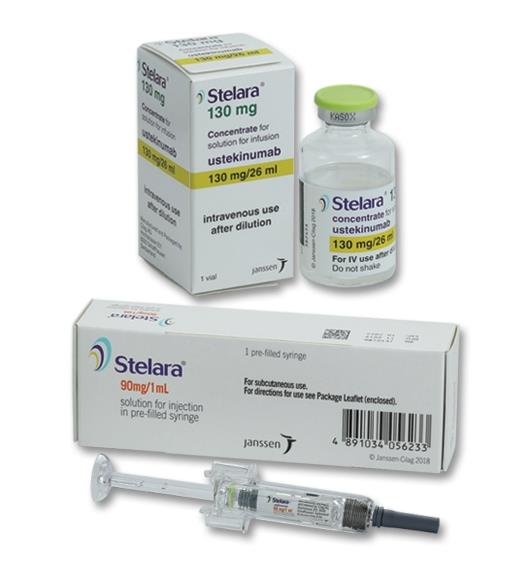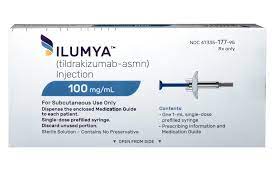Stelara (ustekinumab) vs Ilumya (tildrakizumab)
Stelara (ustekinumab) vs Ilumya (tildrakizumab)
Stelara (ustekinumab) and Ilumya (tildrakizumab) are both biologic medications used to treat moderate to severe plaque psoriasis, but they target different proteins involved in the inflammatory process. Stelara blocks interleukins IL-12 and IL-23, which are believed to play a key role in inflammatory and immune responses, and it is also approved for the treatment of psoriatic arthritis, Crohn's disease, and ulcerative colitis. In contrast, Ilumya specifically targets IL-23 alone and is currently approved solely for the treatment of moderate to severe plaque psoriasis, with a focus on long-term skin clearance. When deciding between the two, patients should consider their specific medical conditions, the drugs' efficacy, their side effect profiles, and the frequency of dosing, and they should consult with their healthcare provider to determine the most appropriate treatment option.
Difference between Stelara and Ilumya
| Metric | Stelara (ustekinumab) | Ilumya (tildrakizumab) |
|---|---|---|
| Generic name | Ustekinumab | Tildrakizumab |
| Indications | Plaque psoriasis, psoriatic arthritis, Crohn's disease, ulcerative colitis | Plaque psoriasis |
| Mechanism of action | Interleukin-12 and interleukin-23 antagonist | Interleukin-23 antagonist |
| Brand names | Stelara | Ilumya |
| Administrative route | Subcutaneous, intravenous | Subcutaneous |
| Side effects | Upper respiratory infections, headache, fatigue, injection site reactions, etc. | Upper respiratory infections, injection site reactions, diarrhea, etc. |
| Contraindications | Active tuberculosis, severe infections, hypersensitivity to ustekinumab | Active tuberculosis, severe infections, hypersensitivity to tildrakizumab |
| Drug class | Monoclonal antibody | Monoclonal antibody |
| Manufacturer | Janssen Biotech | Sun Pharma |
Efficacy
Introduction to Stelara (Ustekinumab) in Psoriasis Treatment
Stelara (ustekinumab) is a biologic medication approved for the treatment of moderate to severe plaque psoriasis in adults who are candidates for phototherapy or systemic therapy. Ustekinumab works by targeting interleukin-12 (IL-12) and interleukin-23 (IL-23), two proteins that play a key role in the inflammatory processes associated with psoriasis. Clinical trials have demonstrated that Stelara can lead to significant skin clearance in many patients. The efficacy of Stelara is often measured by the percentage of patients who achieve a 75% reduction in the Psoriasis Area and Severity Index (PASI 75) score, which is a significant improvement in psoriatic lesions.
Efficacy of Stelara in Clinical Trials
In pivotal phase III clinical trials, Stelara showed a high level of efficacy in treating plaque psoriasis. Data indicated that a majority of patients treated with Stelara achieved PASI 75 within 12 weeks, and many maintained this improvement with continued treatment. Moreover, a significant number of patients were able to achieve PASI 90 and even PASI 100, representing nearly complete or complete clearance of psoriatic lesions. The long-term efficacy of Stelara also has been supported by extension studies, where therapeutic effects were sustained over several years with ongoing treatment.
Introduction to Ilumya (Tildrakizumab) in Psoriasis Treatment
Ilumya (tildrakizumab) is another biologic medication that has been approved for the treatment of adults with moderate to severe plaque psoriasis who are candidates for systemic therapy or phototherapy. Tildrakizumab specifically targets interleukin-23 (IL-23), a cytokine implicated in the pathogenesis of psoriasis. By blocking IL-23, Ilumya helps to reduce the inflammation and skin cell turnover associated with psoriasis. The efficacy of Ilumya is similarly gauged by the achievement of PASI 75, as well as higher thresholds such as PASI 90 and PASI 100, indicating more extensive disease clearance.
Efficacy of Ilumya in Clinical Trials
Clinical trials have shown that Ilumya is effective in achieving significant skin clearance in patients with moderate to severe plaque psoriasis. The majority of patients receiving Ilumya in clinical studies reached PASI 75, and a substantial proportion achieved PASI 90, within 12 weeks of treatment initiation. Long-term data from these trials suggest that the efficacy of Ilumya is maintained with continuous treatment, with many patients sustaining high levels of skin clearance over time. The safety and efficacy profile of Ilumya, as observed in clinical trials, supports its use as a treatment option for patients with psoriasis.
Regulatory Agency Approvals
Stelara
-
European Medical Agency (EMA), European Union

-
Food and Drug Administration (FDA), USA

Ilumya
-
European Medical Agency (EMA), European Union

-
Food and Drug Administration (FDA), USA

Access Stelara or Ilumya today
If Stelara or Ilumya are not approved or available in your country (e.g. due to supply issues), you can access them via Everyone.org.
How it works

Make an enquiry
Choose the medicine you want to buy, answer a couple of questions, and upload your prescription to speed things up. We’ll get back to you within 24 hours.


Make an enquiry
Choose the medicine you want to buy, answer a couple of questions, and upload your prescription to speed things up. We’ll get back to you within 24 hours.


Breeze through the paperwork
We'll guide you through the required documents for importing unapproved medicine, ensuring you have all the necessary information.


Get a personalized quote
We’ll prepare a quote for you, including medicine costs and any shipping, administrative, or import fees that may apply.


Receive your medicine
Accept the quote and we’ll handle the rest - sourcing and safely delivering your medicine.

Some text on this page has been automatically generated. Speak to your physician before you start a new treatment or medication.
Let's talk
If you have any questions, call us or send us a message through WhatsApp or email:
Contact us




